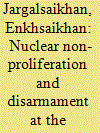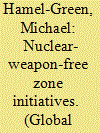|
|
|
Sort Order |
|
|
|
Items / Page
|
|
|
|
|
|
|
| Srl | Item |
| 1 |
ID:
161338


|
|
|
|
|
| Summary/Abstract |
Adoption of the Treaty on the Prohibition of Nuclear Weapons in July 2017 was a major event in the history of seven decades of policies and campaigns for non-proliferation and nuclear disarmament. In this, the role of non-nuclear weapon states (NNWSs) should not be underestimated. However, the treaty’s adoption would require bringing it into force by making use of the political momentum thus far generated. This will not be easy to do due to the position of the nuclear-weapon states and their allies. Hence, continued mutual support and cooperation among the NNWSs is vital, and working with the states under 'nuclear umbrella' will need to be pursued. The article also underlines the continued role of the civil society, both national and international, of nuclear weapon-free zones (NWFZs), and even of individual states contributing to practical nuclear disarmament. As an example of the latter, it examines Mongolia’s role and the challenges it faced when promoting its nuclear weapon-free status policy. The experience underlines the importance of greater understanding of the legitimate interests of each other and willingness to jointly address the issues of common concern, of working patiently in a low-key manner rather than pursuing immediate gains or headline-grabbing effects. The P5 joint declaration of 2012 regarding Mongolia’s status rules out using the country in future regional geopolitical rivalries and as such contributes to greater predictability, stability and confidence. The article also suggests the need for a renewed look at NWFZs from the perspective of twenty-first century technical developments and requirements.
|
|
|
|
|
|
|
|
|
|
|
|
|
|
|
|
| 2 |
ID:
107090


|
|
|
|
|
| Publication |
2011.
|
| Summary/Abstract |
THE FAST MOVING controversial developments in the Middle East and North Africa seem to be sidelining the search for responses to some fundamental security challenges in the region. This refers, for example, to the discussion of steps for the preparation and successful conduct of next year's conference on the establishment of a nuclear-weapon-free zone (NWFZ) in the Middle East. Furthermore, some people think that there is not a favorable environment for such a conference now or in the foreseeable future.
|
|
|
|
|
|
|
|
|
|
|
|
|
|
|
|
| 3 |
ID:
090866


|
|
|
|
|
| Publication |
2009.
|
| Summary/Abstract |
The successful 2006 negotiation of the Central Asian Nuclear Weapon Free Zone (CANWFZ) Treaty indicates the continuing relevance of regional denuclearization measures as an important element in global non-proliferation strategies. Following on earlier nuclear-weapon-free zones in Latin America, the South Pacific, Southeast Asia and Africa, the CANWFZ is the first to be wholly located in the Northern hemisphere. Such zones face major challenges, including the existence of major regional conflicts, regional proliferation developments, lack of effective regional organizations in some regions for negotiating cooperative security arrangements, and difficulties in securing negative security guarantees from nuclear weapon states. Despite in-principle support to such zones, the nuclear powers, with the exception of China, have been highly selective in giving security guarantees to specific zones, with only two zones (Latin America and South Pacific) securing guarantees from most of the nuclear states. Nuclear weapon states are continuing to put their own military navigation, transit or deployment interests ahead of the non-proliferation benefits flowing from whole regions making binding agreements not to develop, acquire or possess nuclear weapons. New opportunities for nuclear-weapon-free zone establishment may be found in a return to multilateralist approaches with the advent of the US Obama Administration, current regional negotiations, and the role of middle level powers in mobilizing international support for nuclear-weapon-free zone initiatives, including further conferences of nuclear-weapon-free zone member countries. Proposed steps forward include: nuclear weapon state reviews of the current non-proliferation benefits of nuclear-weapon-free zones; commissioning of a new UN Experts' Study on nuclear-weapon-free zones; regional studies of the human, economic and climatic impact of nuclear war; and renewed regional nuclear-weapon-free zone efforts to establish new zones and strengthen existing zones.
|
|
|
|
|
|
|
|
|
|
|
|
|
|
|
|
|
|
|
|
|